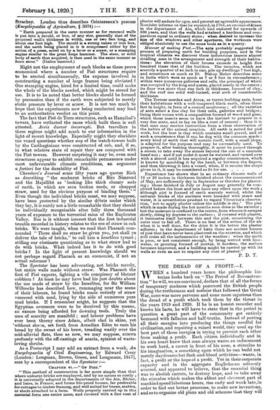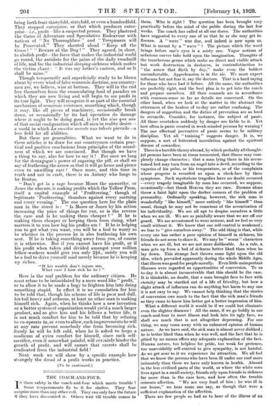THE DREAD OF A PROFIT.—I.
HEN a hundred years hence the philosophic his- torian looks back on " The Period of Reconstruc- tion " he will, we are convinced, declare that of all the forms of temporary madness which possessed the British people during the restlessness and malaise that followed the Great War, none was more perverse and none more injurious than the dread of a profit which took them by the throat in the years 1919 and 1920. If he is an honest recorder and knows his facts, he will have to state that in the period in question a great part of the community got entirely bemused with fallacies and half-truths. Instead of putting all their energies into producing the things needful for civilization, and repairing a ruined world, they used up the best part of those energies in trying to prevent each other from making a profit. Each citizen individually and in his own heart knew that man always wants an inducement to work hard, a carrot in front of his nose, a stimulus to his imagination, a something upon which he can build not merely daydreams but flesh-and-blood activities—wants, in fact, a profit or the hope of a profit. Yet in their corporate capacity and in the aggregate Englishmen solemnly averred, and appeared to believe, that the essential thing was to abolish carrots, to destroy hope, and to take away the stimulus which makes the ablest and cleverest part of mankind spend laborious hours, rise early and woi k late, in order to find out better processes, to make new inventions, and so to organize old plans and old schemes that they will bring forth fruit thirtyfold, sixtyfold, or even a hundredfold. They stopped enterprise, or that which produces enter- prise—i.e., profit—like a suspected person. They plastered the Gates of Adventure and Speculative Endeavour with notices of " No Thoroughfare " and " Trespassers will be Prosecuted." They shouted aloud " Keep off the Grass! " " Beware of the Dog ! " They agreed, in short, to abolish profit—the force that makes the industrial world go round, the antidote for the pains of the daily treadmill of life, and for the industrial sleeping-sickness which makes the victim chant : " It was my father's custom, and so it shall be mine."
Though temporarily and superficially ready to be blown about by every wind of false economic doctrine, our country- men are, we believe, wise at bottom. They will in the end free themselves from the emasculating food of paradox on which they are now living and will begin to see profit in its true light. They will recognize it as part of the essential mechanism of economic existence, something which, though it may, like all pieces of machinery, occasionally break down, or occasionally by its bad operation do damage where it ought to be doing good, is yet the sine qua non of that social configuration which all men in reality desire— a world in which La earriere ouverte aux talents prevails—a free field for all abilities.
But these are generalities. What we want to do in these articles is to draw for our countrymen certain prac- tical and positive conclusions from principles of the sound- ness of which we are convinced. But though we have a thing to say, alas for how to say it ! For once we long for the demagogue's power of sugaring the pill, or shall we say of feathering the arrow so that it will go home and pierce even to unwilling ears ? Once more, and this time in truth and not in craft, there is an Antony who longs to be Brutus.
" Don't get in a rage because Moses the unworthy, or Jones the obscure, is making profits which the Yellow Press, itself a capital example of ' Profiteering,' though of legitimate `Profiteering,' thunders against every morning and every evening." The one question here for the plain man in the street is : " Is Moses or Jones by his action increasing the price of things for you, or is the reverse the case and is he making them cheaper ? " If he is making them cheaper or keeping them from rising, what matters it to you how big his profits are ? If he is helping you to get what you want, you will be a fool to worry as to whether in the process he is also feathering his own nest. If he is taking something away from you, of course it is otherwise. But if you cannot have his profit, or if his profit when taken and divided amongst your million fellow-workers would give you only 2d., surely you will be a fool to drive yourself mad merely because he is heaping up riches.
" If his wealth don't injure me, What care I how rich he be ? "
Here is the real problem for the ordinary citizen. He must refuse to be intimidated by a mere word like " profit," or to allow it to be made a bogy to frighten him into doing something stupid. In effect it is no consolation for him to be told that, though his scheme of life is poor and dull, his toil heavy and arduous, at least no other man is making himself rich. Again, when he thinks how a new invention or a better system of organization would yield a much larger product, and so give him and his fellows a better life, it is not much comfort for him to be told that by refusing to co-operate in, or even to allow, such improvements he will at any rate prevent somebody else from becoming rich. Surely he will be left cold, when he is asked to forgo a modicum of extra comfort for himself, since such self- sacrifice, even if somewhat painful, will certainly hinder the growth of profit, and will ensure that carrots shall be eradicated from the industrial field !
Next week we will show by a specific example how strangely the dread of a profit works in practice.
(To be continued.)



































 Previous page
Previous page